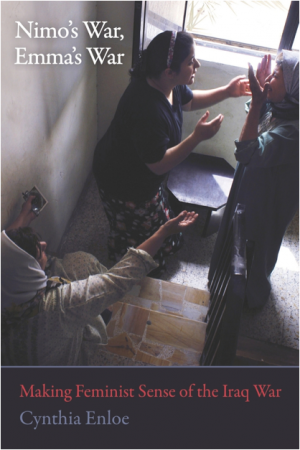Nimo’s War, Emma’s War: Making Feminist Sense of the Iraq War

The stories of eight women’s lives, four Iraqi and four American, establish the framework for an examination of the gendered phases of war. Nimo is a beauty salon owner in Baghdad who keeps her business open through blackouts and listens to what the women there really think. Emma is a mother in Texas, urged to let her second son join the military during wartime. Maha, Danielle, Safah, Kim, Shatha, and Charlene all have stories that in telling offer a deeper look into not only their circumstances, but into the state of the world and of the ravages of wartime.
I have chosen to review several books for Elevate Difference written about the war in Iraq and this has allowed me to study, through these scholarly texts, how this conflict is dividing not only the Iraqi people it was meant to “save,” but our own nation. As resources dwindle, more and more of our populations suffer the lifelong and devastating effects of war.
Statistically rich, and academically vital, this book offers a fresh look at how the Iraq war has changed through phases of occupation and what that means for the women on both sides. Alongside the uniformed soldiers trained and assigned to extremely difficult jobs: homes are destroyed, girls are kept from school for fear of violence, and widows turn to prostitution to support their children.
“As wartime strains the social order and more women from many walks of life decide to take unorthodox steps to sustain their own, and their families’ material survival, violence against women is adopted by some men as a means to restore the gendered order.”
As recruiters become more desperate for new troops, they infiltrate schools, and launch campaigns that involve psychological profiling of parents and teachers to assist them in finding the next soldier to sign. As soldiers are kept from home for longer periods of time, their families struggle to hold together, and when they return, they are often in need of serious medical and psychological assistance, that often falls to the loved ones they return to.
“The American military was loath to acknowledge the mental health consequences of war for its soldiers… these were the soldier’s everyday experiences in a combat zone. If they were treated as the cause of mental disabilities, how could any government wage a war?... Every soldier officially diagnosed with a mental disorder was a soldier whom the Defense Department could not redeploy.”
I am fascinated by war. I find it astounding. More than just an isolated incident of violence, war is entire populations of people agreeing to kill and maim. And war looks very different from a feminist perspective, much different than it does from the predominant masculine agenda.
Cynthia Enloe, Research Professor of Women’s Studies and International Development at Clark University, used only information available through the public domain to gather these stories and examine them. Interviews done by journalists gave her a close look into each woman’s experience. She did not conduct personal interviews, for fear of tilting her studies toward the American women with whom she would have better access. But even with this distance, Nimo’s War, Emma's War is revealing and riveting.